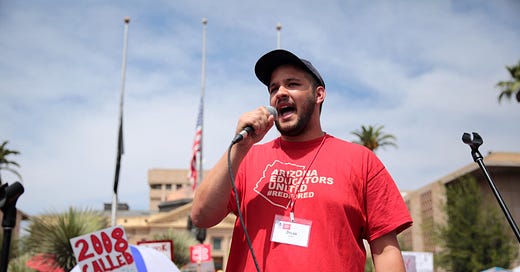One Michigan Democrat's Lonely Stand Against Corporate Subsidies
'Simply put, we know corporate handouts don't work.'

This is Boondoggle, the newsletter about corporations ripping off our states, cities, and communities. If you’re not currently a subscriber, please click the green button below to sign up. Thanks!
Democrats in Michigan have a trifecta — meaning they hold both chambers of the state legislature, as well as the governor’s office — for the first time in 40 years. Wandering that long in the political wilderness causes a lot of pent-up policy desires, so the party has come out of the gate with loads of stuff in the opening weeks of this year’s legislative session.
However, the sausage-making, as they say, has gotten pretty gross. For example, while a tax plan that the state House recently approved included important provisions like an expansion of the state Earned Income Tax Credit, it was also stuffed full of corporate subsidies: About $1.5 billion of them, to be exact, continuing a long trend in that state of throwing money into the coffers of large corporations, even though they have no history of paying off.
But this is not meant to be a sob story. Instead, I want to highlight a House Democrat who had the guts and gumption to say no.
State Rep. Dylan Wegela was the lone Democratic vote against the tax proposal (which passed only because it picked up one Republican vote to offset him). His explicit reasoning was that corporate subsidies have been tried, failed, and don’t need to be tried again in Michigan, particularly at a cost of $1.5 billion over three years. (And to be clear, the Republicans who voted against the tax proposal didn’t do so because of the corporate subsidies, but other parts of the Democratic agenda. Corporate handouts are a bipartisan pastime in Michigan, for sure.)
“Here we are again. Since 1975, Michigan has given over $18 billion in corporate handouts, with most of it coming in the last 20 years. During that time, Michigan has been the third highest in the nation in gifting corporate handouts. The reason I oppose this bill is simple,” Wegela said on Twitter. "It includes up to $1.5 billion in corporate handouts. I ask what do we have to show for this ‘investment’?”


Specifically, the bill will divert up to $600 million annually into a fund called SOAR, which stands for Strategic Outreach and Attraction Fund and is used to give mega-grants to very large corporations. For instance, just this week, Michigan Gov. Gretchen Whitmer announced a $1 billion subsidy package for Ford, which includes more than $200 million in SOAR funds. As I noted last year, immediately after legislators approved the SOAR program and its first $1 billion in funding, the state gave about two-thirds of the money to General Motors.
Wegela was also the only Democrat who voted against an earlier budget bill on the same grounds: That it provided too much in the way of corporate handouts. “Simply put, we know corporate handouts don’t work,” he said. “We must get to a point where we aren’t strong-armed by companies demanding tax breaks and cash in exchange for the chance they will grace us with their business.”


Wegela has predictably taken a lot of heat from partisans on this one. I saw one person call him the Joe Manchin of Michigan, which, for those not familiar, is not exactly a term of endearment in progressive circles. But Wegela is exactly right on the facts: Michigan trails only perennial corporate handout giants New York and Louisiana in the total amount it has gifted to corporations.
Every year since 2017, in fact, Michigan has been in the top three or four states for doling out that cash, and yet it keeps trying again, with lawmakers taking nary a moment to alter or update their justifications. The parties in control may change, but the love affair with corporate handouts stays the same.
Wegela is a former school teacher (the picture at the top of this piece is from an education-funding related protest in Arizona, where he taught for a few years), so has been on the front lines when it comes to the negative effects of corporate subsidies. Since many of them are based on property tax cuts, they disproportionately affect local school districts; there’s a reason so many teachers fight so hard against new rounds of corporate handouts.
This all occurred shortly after the Detroit News detailed in exhaustive fashion how major corporate have colluded with elected officials all across Michigan to hide the details of their subsidy dealing from the public, using those pervasive nondisclosure agreements I write so much about. Dozens of elected leaders have signed these corrupt agreements to grease the skids for new subsidy deals. Wegela correctly noted that that practice, too, is very problematic.
Though it didn’t have any effect on the outcome, I appreciate seeing an elected leader standing up for the evidence on this one and being willing to defy his own party while doing so. More of this, please.
Thanks for reading this edition of Boondoggle. If you liked it, please take a moment to click the little heart under the headline or below. And forward it to friends, family, or neighbors using the green buttons. Every click and share really helps.
If you don’t subscribe already and you’d like to sign up, just click below.
Thanks again!
— Pat Garofalo



I've often thought that if a state invests in a company, shouldn't that company be giving stock in exchange?